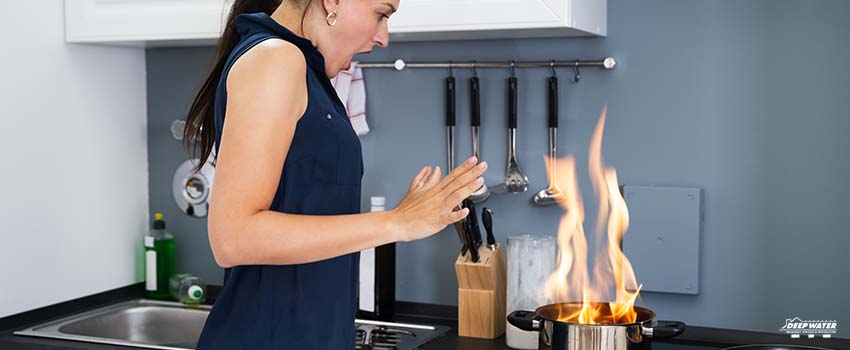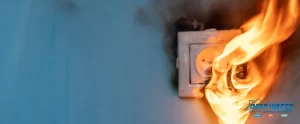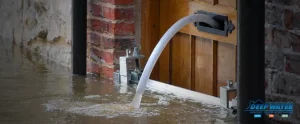Cooking is not an entirely dangerous activity. Although accidental cuts while using a kitchen knife do happen at times, these are not considered as life threatening. The real danger is when a fire starts in the kitchen area. A fire like this is often due to ranges or stoves where a pot or pan filled with grease or cooking oil has been placed, igniting what is known as a grease fire.
As the name implies, grease fires are those that involve cooking oil. This is why they are sometimes called cooking oil fires.
What Type of Fire is a Grease Fire
Grease fires fall under the Class K fire category, which covers conflagrations that involve cooking oil. Technically, however, Class K is less known and is often placed under the larger Class B category which encompasses fires caused by flammable liquids or gases, including oils, tars, petroleum greases, solvents, kerosene, propane, natural gas, and oil-based paints.
In any case, grease and oil fires present great risks. The National Fire Protection Association reports that between 2010-2014, almost 46% of reported home fires were caused by cooking, with 19% of these involving the use of cooking equipment and products.
How Do Grease Fires Start
Grease fires occur when the oil used for cooking becomes too hot while in a pan. This will initially boil before it starts to smoke. If left alone and unattended, the smoking oil will soon catch fire. This can happen in as little as 30 seconds, so it’s important that you are always on guard when cooking in the kitchen.
A grease fire is often more dangerous when compared to other fire types because it can easily spread to other places if not extinguished quickly. Attempting to put out grease fires could result in serious injuries if the wrong material is used.
Things You Should Not Do When Extinguishing Grease Fires
If the oil in your cooking pan catches fire, remember not to do the following:
1. Don’t Use Water
Never attempt to put out a cooking oil fire using water. Keep in mind that oil and water don’t mix because they don’t share the same density, Putting them together can only cause the flames to further spread. Also, water on grease fire will turn the former into steam within nanoseconds due to the latter’s high temperature. The oil molecules can also attach themselves to the water molecules, resulting in the steam technically carrying the flames to nearby surfaces, thereby spreading the fire to the surrounding areas.
2. Don’t Move the Burning Pot
Just like the case with water, doing this will likely cause the grease to splash onto you or to the kitchen surface and nearby cooking materials. This can cause the fire to grow bigger and expose you to serious injuries, particularly burns around the arm and hand areas.
3. Don’t Use a Class A Fire Extinguisher
A Class K fire extinguisher can effectively handle grease fires. This is usually made from wet chemicals and is often found in commercial kitchens. Class K fire extinguishers are specifically designed for cooking fires, forming soapy foams that cover the flame and cutting off airflow.
4. Don’t Use Baking Powder or Flour
These cooking items have a different chemical composition and will not react well with grease or oil. They could even end up making your fire worse as the two are known to explode when heated.
Ways to Handle Grease Fires
As grease fires can be dangerous, it’s crucial that you handle them with caution and extinguish them if possible. The following should be considered:
1. Stay Calm
Grease fires will happen unannounced, but there will be signs that it’s set to take place. It is thus important to be aware of what’s happening while you’re in the kitchen. If a fire starts, don’t go into panic mode, get hold of yourself so you can think clearly on how to put out a grease fire.
2. Switch Off the Heat Source
The fire began from a heat source. If you are cooking and the pot catches fire, the source of your heat is either an oven, a burner, or a broiler. Turn them off so your fire won’t grow bigger.
3. Cover the Pot or Pan
To stop a grease fire, you need to keep it from absorbing oxygen. This can be done by carefully sliding a metal lid over the pan where the fire originated. With the oxygen supply cut off, the fire will eventually burn itself out.
Metal is the key element in this situation. Glass or plastic lids should not be used as covering because they can melt or shatter in the heat of the fire.
4. Pour Salt Over the Flame
Salt or baking soda can also be used to remove oxygen from a fire. Salt acts as a barrier between the fire and the air while baking soda releases carbon dioxide when heated, which should smother the fire.
5. Use a Special Fire Extinguisher
The first thing most people do when they see a cooking oil fire in the kitchen is to grab a fire extinguisher. This is not always a wise decision because not all fire extinguishers are designed to put out these fire types. The best extinguisher for grease fire is the Class K unit as this is made from wet chemicals and is often found in commercial kitchens.
6. Call an Emergency Number
Grease fires can quickly get out of control, so if you are unsure about your ability to extinguish them or are simply unable to contain them, it’s best to call 911 or your local emergency services. Don’t wait for the fire to go out by itself because it won’t.
7. Leave the Area
For your safety and that of your family, evacuating your home temporarily may have to be considered at least until firefighters have successfully put the grease fire down. To help control the flames, close the door to the kitchen when you leave the house.
Key Takeaway
Grease fires, also called cooking oil fires, are dangerous because they can quickly spread from the kitchen to other areas of the house. Since grease fire involves oil, using water to extinguish it is not recommended, but there are other ways worth trying so the flames can be controlled until the rescue team arrives.
Contact Deep Water Emergency Services & Mitigation to handle grease fires at home.
Grease fires tend to spread quickly, but you can count on Deep Water Emergency Services & Mitigation to help you put them out. We also have a professional team composed of fire damage mitigation Denver, CO, specialists who can perform the needed repairs and restore your home to its pre-fire condition. Call us now and experience our unique service.






